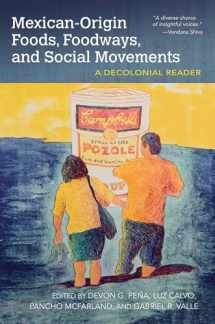
Mexican-Origin Foods, Foodways, and Social Movements : Decolonial Perspectives (Food and Foodways)
ISBN-13:
9781682260364
ISBN-10:
1682260364
Edition:
1
Author:
Gabriel R. Valle, Luz Calvo, Devon Peña, Pancho McFarland
Publication date:
2017
Publisher:
University of Arkansas Press
Format:
Paperback
440 pages
Category:
Food Science
,
Agricultural Sciences
,
Emigration & Immigration
,
Social Sciences
,
Cultural
,
Anthropology
FREE US shipping
Book details
ISBN-13:
9781682260364
ISBN-10:
1682260364
Edition:
1
Author:
Gabriel R. Valle, Luz Calvo, Devon Peña, Pancho McFarland
Publication date:
2017
Publisher:
University of Arkansas Press
Format:
Paperback
440 pages
Category:
Food Science
,
Agricultural Sciences
,
Emigration & Immigration
,
Social Sciences
,
Cultural
,
Anthropology
Summary
Mexican-Origin Foods, Foodways, and Social Movements : Decolonial Perspectives (Food and Foodways) (ISBN-13: 9781682260364 and ISBN-10: 1682260364), written by authors
Gabriel R. Valle, Luz Calvo, Devon Peña, Pancho McFarland, was published by University of Arkansas Press in 2017.
With an overall rating of 4.4 stars, it's a notable title among other
Food Science
(Agricultural Sciences, Emigration & Immigration, Social Sciences, Cultural, Anthropology) books. You can easily purchase or rent Mexican-Origin Foods, Foodways, and Social Movements : Decolonial Perspectives (Food and Foodways) (Paperback) from BooksRun,
along with many other new and used
Food Science
books
and textbooks.
And, if you're looking to sell your copy, our current buyback offer is $1.03.
Description
Winner, 2018 ASFS (Association for the Study of Food and Society) Book Award, Edited Volume
This collection of new essays offers groundbreaking perspectives on the ways that food and foodways serve as an element of decolonization in Mexican-origin communities.
The writers here take us from multigenerational acequia farmers, who trace their ancestry to Indigenous families in place well before the Oñate Entrada of 1598, to tomorrow’s transborder travelers who will be negotiating entry into the United States. Throughout, we witness the shifting mosaic of Mexican-origin foods and foodways in the fields, gardens, and kitchen tables from Chiapas to Alaska.
Global food systems are also considered from a critical agroecological perspective, including the ways colonialism affects native biocultural diversity, ecosystem resilience, and equality across species, human groups, and generations.
Mexican-Origin Foods, Foodways, and Social Movements is a major contribution to the understanding of the ways that Mexican-origin peoples have resisted and transformed food systems. It will animate scholarship on global food studies for years to come.
This collection of new essays offers groundbreaking perspectives on the ways that food and foodways serve as an element of decolonization in Mexican-origin communities.
The writers here take us from multigenerational acequia farmers, who trace their ancestry to Indigenous families in place well before the Oñate Entrada of 1598, to tomorrow’s transborder travelers who will be negotiating entry into the United States. Throughout, we witness the shifting mosaic of Mexican-origin foods and foodways in the fields, gardens, and kitchen tables from Chiapas to Alaska.
Global food systems are also considered from a critical agroecological perspective, including the ways colonialism affects native biocultural diversity, ecosystem resilience, and equality across species, human groups, and generations.
Mexican-Origin Foods, Foodways, and Social Movements is a major contribution to the understanding of the ways that Mexican-origin peoples have resisted and transformed food systems. It will animate scholarship on global food studies for years to come.


We would LOVE it if you could help us and other readers by reviewing the book
Book review

Congratulations! We have received your book review.
{user}
{createdAt}
by {truncated_author}


